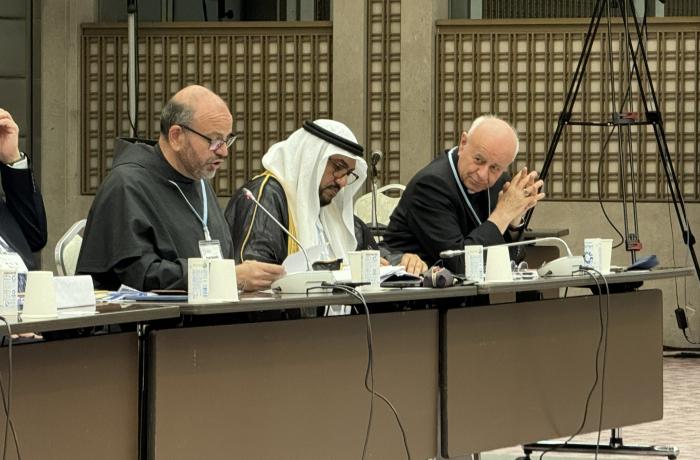The meeting taking place in the city bruised by the wound of the atomic bomb also involves Eastern religious traditions in the Rome Call for an Ethics of AI, promoted by the Pontifical Academy for Life. A specific addendum on the challenges posed by generative artificial intelligence is added to the 2020 principles on safeguarding peace and the dignity of every person.
Hiroshima (AsiaNews) – “In Hiroshima, a place of great symbolic value, we strongly call for peace, and we ask that technology be a driving force for peace and reconciliation between peoples. We are here to say loud and clear that being together and acting together is the only possible solution.”
This is how Msgr. Vincenzo Paglia, president of the Pontifical Academy for Life, opened today on the first of two days of Holy Week. AI Ethics for Peacean event aimed at promoting a common commitment to the ethics of artificial intelligence, supported since 2020 by the Holy See with representatives from the Jewish and Muslim world, the FAO and some large IT companies and now expanded to involve representatives of Eastern religions.
The meeting will have its central moment tomorrow with the signing ceremony by the representatives of the regions of the Rome Calls for AI Ethicsthe document indicating a series of principles for algorithmics, that is, an ethic that keeps the person and justice at the center of relations between peoples in the development and application of artificial intelligence.
The signing will take place largely at the Memorial Park commemorating the victims of the American atomic bombing of 1945, and after hearing the words of a survivor of this tragedy, the result of an inhumane form of technological development.
“Our mission as Religions for Peace in Japan“The purpose of the General Assembly is to support and guide efforts to improve equality and mutual respect among individuals and institutions throughout society, based on our shared spiritual goals,” its president, Buddhist monk Yoshiharu Tomatsu, said at the opening session. “Recent advances in artificial intelligence have led to the emergence of powerful new tools that have the potential to either aid these efforts or, if used for other purposes, significantly undermine them. Recognizing these challenges, we commit to upholding our commitments to inclusion and mutual respect for all.”
“Cooperation, solidarity and working together are necessary to face the developments of artificial intelligence, where interests, harms and benefits are mixed, to ensure that its systems and products are not only technically advanced but also morally sound,” added Mauritanian Muslim Abdallah Bin Bayyah, chairman of the Abu Dhabi Peace Forum and the UAE Fatwa Council.
“As people of faith, we have a unique responsibility to infuse our AI research with moral clarity and ethical integrity. We use AI not only as a tool for progress, but also as a means to deepen our connection with the divine and strengthen our spiritual journey,” said Rabbi Eliezer Simha Weisz, a member of the Interfaith Relations Committee of the Chief Rabbinate of Israel.
The speech by Father Paolo Benanti, an Italian religious and one of the pioneers in the study of the ethical implications of these new frontiers of technology, who presented the Hiroshima Addendum on Generative Artificial Intelligence, a new text that will complete the Rome Calls for AI Ethics (written in 2020), delving deeper into this dimension which today represents the new frontier of this technological development.
The significance of this moment was also underscored by the leading technology leaders in attendance. “With its profound place in human history, Hiroshima provides an exciting backdrop to help ensure that technology created by humanity serves all of humanity and our common home,” said Microsoft President Brad Smith, one of the original signatories of the statement. Rome Calls for AI Ethics.
“AI is a technology that has implications for every country, industry and value system – and its benefits are expected to impact all of humanity,” added Dario Gil, senior vice president and chief research officer at IBM.
“We believe that ensuring the broadest possible participation is a critical step toward a comprehensive approach to responsible AI,” said Dave West, president of Cisco’s Asia Pacific, Japan and Greater China region.


